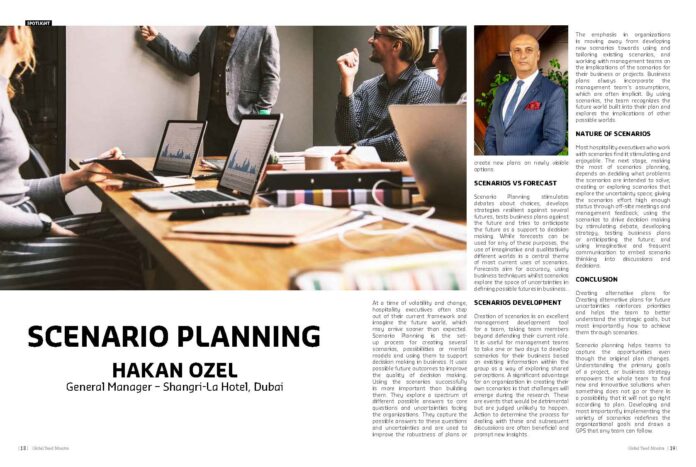Hakan Ozel, General Manager – Shangri-La Hotel, Dubai
At a time of volatility and change, hospitality executives often step out of their current framework and imagine the future world, which may arrive sooner than expected. Scenario Planning is the set-up process for creating several scenarios, possibilities or mental models and using them to support decision making in business. It uses possible future outcomes to improve the quality of decision making. Using the scenarios successfully is more important than building them. They explore a spectrum of different possible answers to core questions and uncertainties facing the organizations. They capture the possible answers to these questions and uncertainties and are used to improve the robustness of plans or create new plans on newly visible options.
Scenarios vs Forecast
Scenario Planning stimulates debates about choices, develops strategies resilient against several futures, tests business plans against the future and tries to anticipate the future as a support to decision making. While forecasts can be used for any of these purposes, the use of imaginative and qualitatively different worlds is a central theme of most current uses of scenarios. Forecasts aim for accuracy, using business techniques whilst scenarios explore the space of uncertainties in defining possible futures in business..
Scenarios Development
Creation of scenarios is an excellent management development tool for a team, taking team members beyond defending their current role. It is useful for management teams to take one or two days to develop scenarios for their business based on existing information within the group as a way of exploring shared perceptions. A significant advantage for an organization in creating their own scenarios is that challenges will emerge during the research. These are events that would be detrimental but are judged unlikely to happen. Action to determine the process for dealing with these and subsequent discussions are often beneficial and prompt new insights.
The emphasis in organizations is moving away from developing new scenarios towards using and tailoring existing scenarios, and working with management teams on the implications of the scenarios for their business or projects. Business plans always incorporate the management team’s assumptions, which are often implicit. By using scenarios, the team recognizes the future world built into their plan and explores the implications of other possible worlds.
Nature of Scenarios
Most hospitality executives who work with scenarios find it stimulating and enjoyable. The next stage, making the most of scenarios planning, depends on deciding what problems the scenarios are intended to solve; creating or exploring scenarios that explore the uncertainty space; giving the scenarios effort high enough status through off-site meetings and management feedback; using the scenarios to drive decision making by stimulating debate, developing strategy, testing business plans or anticipating the future; and using imaginative and frequent communication to embed scenario thinking into discussions and decisions.
Conclusion
Creating alternative plans for Creating alternative plans for future uncertainties reinforces priorities and helps the team to better understand the strategic goals, but most importantly how to achieve them through scenarios.
Scenario planning helps teams to capture the opportunities even though the original plan changes. Understanding the primary goals of a project, or business strategy empowers the whole team to find new and innovative solutions when something does not go or there is a possibility that it will not go right according to plan. Developing and most importantly implementing the variety of scenarios redefines the organizational goals and draws a GPS that any team can follow.
